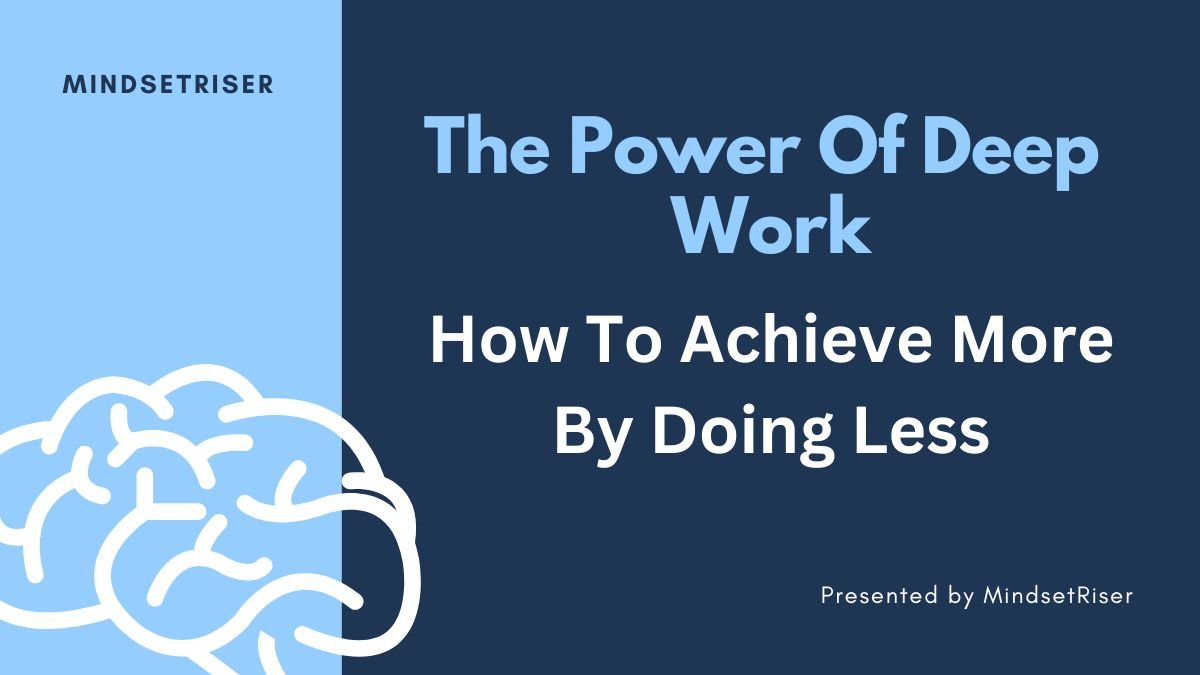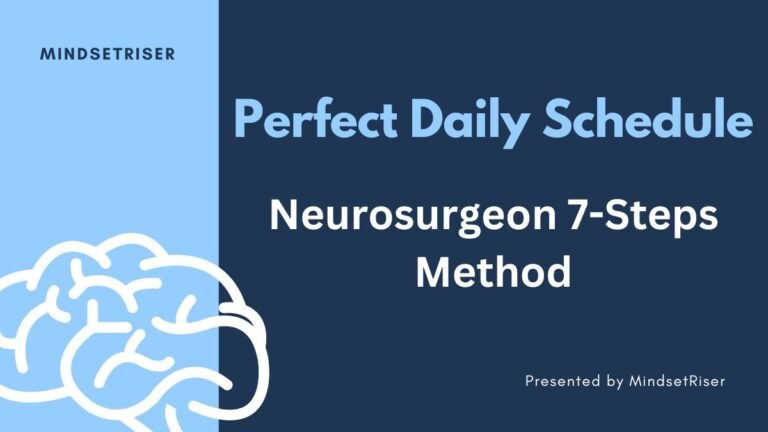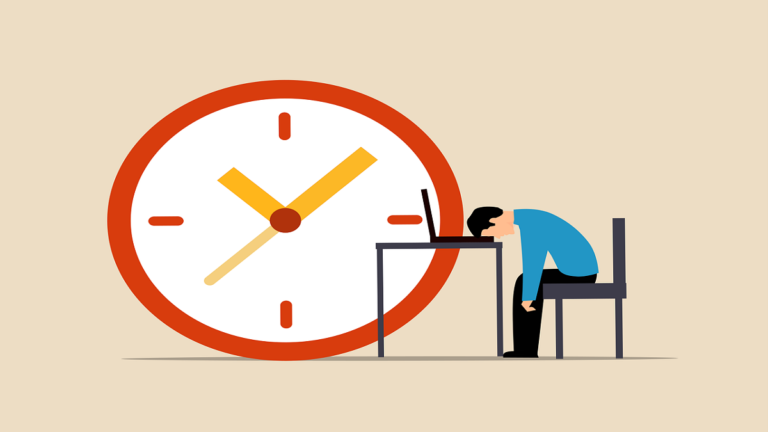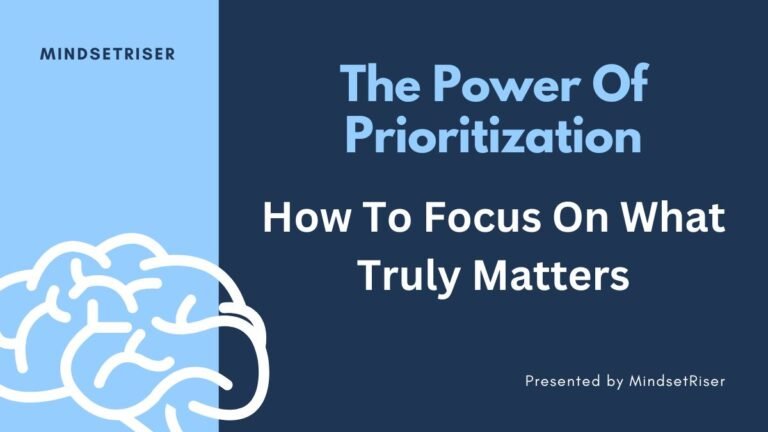The Power of Deep Work: How to Achieve More by Doing Less
In today’s fast-paced, distraction-filled world, it often feels like we need to be constantly busy to succeed. However, true productivity doesn’t come from working harder or working longer hours—it comes from working smarter and focusing deeply on what truly matters. This is where the concept of deep work comes in. In this article, we’ll explore:✅…
In today’s fast-paced, distraction-filled world, it often feels like we need to be constantly busy to succeed. However, true productivity doesn’t come from working harder or working longer hours—it comes from working smarter and focusing deeply on what truly matters. This is where the concept of deep work comes in.
In this article, we’ll explore:
✅ The definition of deep work
✅ The benefits of deep work for achieving more
✅ Practical tips to incorporate deep work into your life
Let’s dive into how you can achieve more by doing less, focusing on deep, meaningful work instead of constant busyness.
What is Deep Work and Why Does It Matter?
Deep work, a concept popularized by author Cal Newport, refers to focused, undistracted work that allows you to produce high-quality results in less time. This kind of work requires intense concentration and is often done in an environment free of distractions.
In contrast, shallow work consists of tasks that don’t require much cognitive effort, such as checking emails, scrolling through social media, or attending unnecessary meetings. While shallow work may seem urgent, it doesn’t produce the kind of impactful results that deep work does.
Why Deep Work Matters:
- Increased productivity: When you focus deeply on a single task, you’re able to accomplish it more efficiently.
- Better quality output: Deep work allows you to produce high-quality, innovative results in a shorter amount of time.
- Enhanced skills: Regular deep work helps you master difficult concepts or tasks, leading to continuous personal and professional growth.
- A sense of accomplishment: Completing a deep work session gives you a sense of fulfillment and progress, unlike shallow work that often leaves you feeling drained.
What is Deep Work and Why Does It Matter?
Deep work is a concept introduced by productivity expert Cal Newport in his book Deep Work: Rules for Focused Success in a Distracted World. It refers to a state of focused, undistracted work that leads to high-value output. When you engage in deep work, you train your mind to concentrate fully on a challenging task, eliminating distractions and improving the quality of your results.
Deep Work vs. Shallow Work
To understand why deep work is so powerful, it’s important to distinguish it from shallow work, which dominates many people’s daily routines.
| Deep Work | Shallow Work |
|---|---|
| Requires full concentration | Involves multitasking and frequent interruptions |
| Leads to high-quality output | Produces low-value, repetitive tasks |
| Increases productivity and efficiency | Consumes time but yields little progress |
| Strengthens cognitive abilities | Keeps the mind in a distracted, reactive state |
| Examples: Writing, coding, problem-solving, strategic planning | Examples: Checking emails, responding to messages, attending unnecessary meetings |
Shallow work might feel productive, but it often doesn’t contribute to meaningful progress. Deep work, on the other hand, allows you to create exceptional results in less time.
Why Deep Work is Essential for Success
Deep work is not just a productivity hack—it’s a game-changer for success in any field. Here’s why:
- You achieve more in less time – A few hours of focused work can produce better results than an entire day filled with interruptions.
- You develop valuable skills – Whether it’s mastering a new language, writing a book, or coding a complex program, deep work helps you improve faster.
- You stand out in your field – In a world where most people are distracted, those who can focus deeply gain a massive competitive advantage.
- You experience more fulfillment – Working without distractions allows you to enter a flow state, where work becomes more enjoyable and meaningful.
The ability to concentrate deeply is becoming rarer—yet it’s also becoming more valuable. Those who can master deep work will be the ones who achieve more while working less.
How to Incorporate Deep Work Into Your Daily Life
Deep work isn’t something that just happens—it requires intention, structure, and discipline. Here’s how you can make deep work a regular part of your routine:
1. Schedule Deep Work Sessions
If you don’t plan for deep work, it won’t happen. Treat it like an important meeting and block out time on your calendar for focused work.
✅ How to do it:
- Set aside 90-minute blocks for deep work, preferably in the morning when your mind is freshest.
- Use the time-blocking method—allocate specific hours of your day solely for deep work.
- Let others know that you’re unavailable during this time to minimize interruptions.
2. Eliminate Distractions
Distractions are the biggest enemy of deep work. Even a single notification can break your focus and make it harder to regain momentum.
✅ How to minimize distractions:
- Turn off notifications on your phone, email, and messaging apps.
- Use website blockers like Freedom or Cold Turkey to prevent access to social media during deep work sessions.
- Find a quiet workspace where you won’t be disturbed.
3. Train Your Brain for Focus
If you’re used to multitasking, focusing deeply for long periods might feel challenging at first. Like any skill, focus improves with practice.
✅ How to strengthen your focus:
- Start with short deep work sessions (30-45 minutes) and gradually increase them over time.
- Try the Pomodoro technique—work deeply for 25-50 minutes, then take a 5-10 minute break.
- Practice mindfulness or meditation to improve concentration.
4. Prioritize High-Impact Work
Not all tasks require deep work. Focus your deep work sessions on activities that create the most value in your personal or professional life.
✅ Examples of tasks that benefit from deep work:
- Writing (articles, books, research papers)
- Coding and software development
- Strategic thinking and planning
- Learning complex skills
- Problem-solving and creative brainstorming
Avoid wasting deep work time on emails, administrative tasks, or meetings—these are better suited for shallow work hours.
5. Establish a Deep Work Ritual
A ritual signals to your brain that it’s time to enter a deep work state. This helps you transition into focus mode more efficiently.
✅ How to create a deep work ritual:
- Set up your workspace—clear clutter and have everything you need ready.
- Play instrumental music or ambient sounds to enhance concentration.
- Use a pre-work routine (e.g., making coffee, stretching, or journaling) to mentally prepare.
6. Measure Your Progress
Tracking your deep work sessions helps you stay accountable and improve over time.
✅ How to track deep work:
- Keep a deep work log where you note the hours you spent focused each day.
- Set weekly or monthly goals for how many deep work sessions you want to complete.
- Reflect on what worked well and what needs adjustment.
The more you track and refine your deep work practice, the more productive and effective you’ll become.
Conclusion: Master Deep Work to Achieve More with Less Effort
In a world filled with constant distractions, mastering deep work is one of the most valuable skills you can develop. By focusing intensely on meaningful tasks, you can achieve more in less time, enhance your skills, and stand out in your field.
To integrate deep work into your life:
✅ Schedule dedicated deep work sessions and treat them as non-negotiable.
✅ Eliminate distractions by turning off notifications and setting up a distraction-free environment.
✅ Train your brain to focus with techniques like the Pomodoro method and mindfulness.
✅ Prioritize high-impact work that moves you toward your biggest goals.
✅ Establish a deep work ritual to make it easier to enter a state of intense focus.
✅ Track your progress to refine your deep work habits over time.
Deep work is not about working harder—it’s about working smarter. By committing to focused, high-value work, you’ll unlock higher productivity, achieve meaningful success, and create more time for the things that truly matter.







